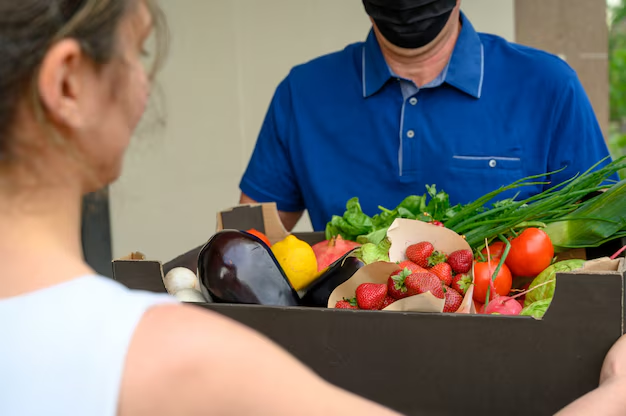How to Find the Nearest Food Bank: A Comprehensive Guide
In today’s world, many individuals and families are seeking out food banks and pantries to help manage tight budgets or navigate unexpected financial hardships. If you're asking, "Where is the food bank near me?" you're not alone, and discovering local resources can be a real lifeline. This article is your comprehensive guide to locating food banks, understanding how they work, and maximizing the support they offer.
🔎 Finding the Nearest Food Bank
Online Resources and Tools
Using Search Engines: Start by entering "food bank near me" in your preferred search engine. Advanced algorithms can pinpoint your location and show nearby food banks. Additionally, Google Maps can provide directions and show real-time traffic updates to assist with your visit.
Online Directories: Websites of national organizations, typically focused on hunger relief, often feature searchable directories to connect you with local food banks. These platforms are regularly updated and can include valuable details such as operating hours and contact information.
Apps for Accessibility: Explore mobile apps dedicated to connecting users with food assistance resources. These apps are designed to help users quickly find food bank locations, check availability of services, and obtain essential information easily.
Offline Methods
Community Centers: Often, community centers or local churches can offer lists or direct you to nearby food banks. They may also provide additional services such as clothing distribution, housing information, or employment assistance.
Local Government Offices: Municipal offices frequently collaborate with food banks and can guide residents to available resources. Visiting or calling your local government office might yield fruitful information about where you can find help.
📋 Understanding Food Banks and Their Services
What is a Food Bank?
Food banks are non-profit organizations that collect, store, and distribute food to those in need. Typically, food banks operate at a larger scale, managing logistics and storage, and then distribute food to smaller community partners like food pantries or soup kitchens.
Food Pantries vs. Food Banks: A food pantry is often a local branch of a food bank, where individuals can go to pick up food supplies. While food banks focus on large-scale distribution and storage, pantries are directly accessible to the community, often located within neighborhoods for easier access.
Types of Food and Services Offered
Non-Perishable Items: Common staples include canned goods, rice, pasta, and cereals. These items are selected for their long shelf life and ease of storage.
Fresh Produce: Many food banks now offer fresh fruits and vegetables, striving to provide nutritionally balanced options to the communities they serve.
Nutritional Guidance: Some food banks incorporate educational programs to help individuals make healthy food choices and effectively manage their resources.
Additional Support Services: Beyond food, some food banks may offer or connect individuals with services like nutrition workshops, health screenings, or SNAP (Supplemental Nutrition Assistance Program) applications.
😊 Leveraging Food Bank Services
Preparing for Your Visit
Necessary Documentation: It’s important to check if you need to bring any documents. Generally, proof of residence or photo identification is preferred, but each location might have different requirements.
Contact Ahead: Call or visit the food bank’s website to confirm details such as operational hours, eligibility criteria, and what to bring. This ensures that your visit is as smooth as possible.
Maximizing Your Experience
Asking About Additional Services: Don’t hesitate to inquire if the food bank offers other resources you might need. They may have partnerships with organizations providing financial counseling, job placement, or community workshops.
Volunteering Opportunities: If possible, consider volunteering at the food bank. This not only supports the organization but can also be a rewarding way to give back to your community and gain practical experience.
📈 Food Insecurity and Community Impact
The Bigger Picture
Food banks play a crucial role in addressing food insecurity, which affects many households globally. By providing food relief, they help alleviate some of the pressures faced by families, enabling them to allocate funds to other essential needs or unexpected expenses.
The Role of Food Banks During Emergencies
In times of crisis, such as natural disasters or pandemics, food banks often ramp up operations to ensure reliable access to food resources. They work closely with local authorities and other organizations to meet increased demand and logistical challenges.
🌟 Key Takeaways
Here's a quick overview to help you navigate finding and using food banks effectively:
- Use Online Tools: Leverage search engines, online directories, and mobile apps to find nearby food banks.
- Document Readiness: Ensure you have the necessary ID or proof of residence if required.
- Explore Additional Services: Inquire about nutritional guidance, health screenings, and application assistance.
- Consider Volunteering: Helping out supports your community and can be personally rewarding.
- Understand the Impact: Recognize how food banks are vital in combating community-wide food insecurity.
🗺️ Mapping the Journey
Finding a food bank near you doesn't have to be daunting. With accessible tools and community resources, you can locate and leverage these invaluable services for assistance or support in challenging times. Beyond simply feeding individuals, food banks foster community resilience, belonging, and hope for a better tomorrow.
By understanding the structure, services, and significance of food banks, not only can you secure food for you and your family, but you can also become part of a broader movement that supports and uplifts communities in need.

Related Topics
